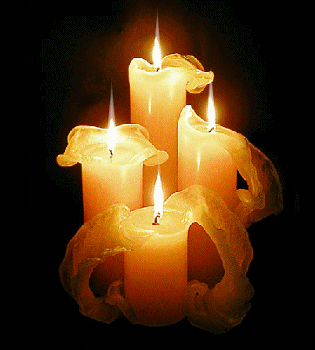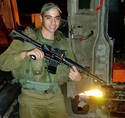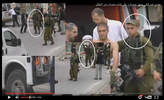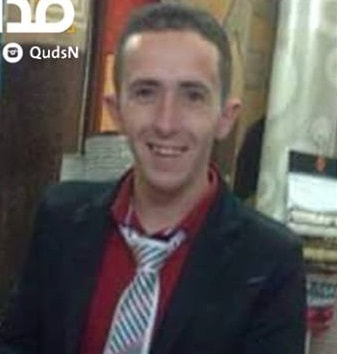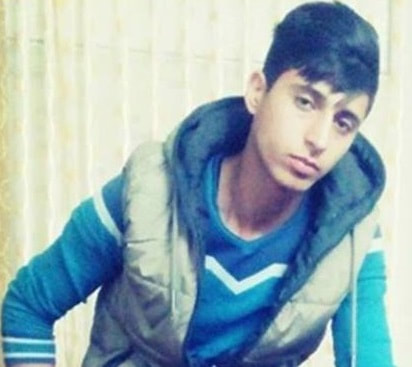24 july 2016
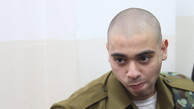
The soldier who shot a wounded terrorist in Hebron gives his first testimony as the defense takes the stand; Azaria: 'The company commander yelled at me, and slapped me twice.'
Sgt. Elor Azaria claimed in court on Sunday that he shot dead a wounded terrorist in Hebron because he sensed “clear and present danger."
"I acted because I saw the clear and present danger. I felt I didn't have a choice, and that this could have ended with casualties," the soldier said.
Azaria, who was charged with manslaughter, began his testimony to the court on Sunday and is expected to testify for two additional days.
Azaria began by describing the general atmosphere in Hebron, where he was serving with the Kfir Brigade.
"In that area of operations, the magazine is always in the weapon because there is a lot of friction there, and you are under constant threat. There is always a feeling of tension in the air, especially in Tel Rumeida, which is the site of most friction between Palestinians and Jews anywhere in the world. It's a stressful place," he said
"You can't walk through Hebron like you can in Tel Aviv. There is always fear in the air. You hear shooting and explosions at night when you're trying to sleep, he went on to say.
Speaking about the incident itself, Azaria recounted, "I was in the guard tower at the Jilber checkpoint, close to where the incident took place. We were there in order to stop terror attacks. We were briefed about the rules of engagement and when to open fire during the briefing, along with talking to us about intent and ability (for terrorists to carry out attacks –ed), and stabbing attacks. In one of the briefings, one of the company commanders told us that we shouldn't walk around with the Mak Porek (a kind of safety bullet –ed.) in place in certain areas of the city due to the tensions."
He also addressed the rules of engagement, saying "No one has spoken to us about what to do when there's a bomb, or a combined attack. I heard the Yehuda Division commander saying if there was a knife attack it's unlikely there'll be a bombing. We saw last week in Jerusalem that there was a terrorist with both a bomb and knives."
"The fact soldiers aren't briefed on explosives is a mistake that can cost lives," he said in criticism of his commanders.
Recalling the incident itself, Azaria said: "I was sleeping right before the incident. That morning, one of the soldiers came into my room and said 'Elor! Wake up! There's an emergency!' I woke up quickly and ran to the company commander's office and he wasn't there. I didn’t understand what was happening at all. I ran to the gate and asked what was going on. The guard at the gate told me that there was a terror attack, and that A. was stabbed. I ran to the area of the attack, and the company commander was there and told me to begin treating A."
Sgt. Elor Azaria claimed in court on Sunday that he shot dead a wounded terrorist in Hebron because he sensed “clear and present danger."
"I acted because I saw the clear and present danger. I felt I didn't have a choice, and that this could have ended with casualties," the soldier said.
Azaria, who was charged with manslaughter, began his testimony to the court on Sunday and is expected to testify for two additional days.
Azaria began by describing the general atmosphere in Hebron, where he was serving with the Kfir Brigade.
"In that area of operations, the magazine is always in the weapon because there is a lot of friction there, and you are under constant threat. There is always a feeling of tension in the air, especially in Tel Rumeida, which is the site of most friction between Palestinians and Jews anywhere in the world. It's a stressful place," he said
"You can't walk through Hebron like you can in Tel Aviv. There is always fear in the air. You hear shooting and explosions at night when you're trying to sleep, he went on to say.
Speaking about the incident itself, Azaria recounted, "I was in the guard tower at the Jilber checkpoint, close to where the incident took place. We were there in order to stop terror attacks. We were briefed about the rules of engagement and when to open fire during the briefing, along with talking to us about intent and ability (for terrorists to carry out attacks –ed), and stabbing attacks. In one of the briefings, one of the company commanders told us that we shouldn't walk around with the Mak Porek (a kind of safety bullet –ed.) in place in certain areas of the city due to the tensions."
He also addressed the rules of engagement, saying "No one has spoken to us about what to do when there's a bomb, or a combined attack. I heard the Yehuda Division commander saying if there was a knife attack it's unlikely there'll be a bombing. We saw last week in Jerusalem that there was a terrorist with both a bomb and knives."
"The fact soldiers aren't briefed on explosives is a mistake that can cost lives," he said in criticism of his commanders.
Recalling the incident itself, Azaria said: "I was sleeping right before the incident. That morning, one of the soldiers came into my room and said 'Elor! Wake up! There's an emergency!' I woke up quickly and ran to the company commander's office and he wasn't there. I didn’t understand what was happening at all. I ran to the gate and asked what was going on. The guard at the gate told me that there was a terror attack, and that A. was stabbed. I ran to the area of the attack, and the company commander was there and told me to begin treating A."

A., the wounded soldier, being treated at the scene of the attack
"I saw blood spurting out of A.'s wound," Azaria continued. "I pressed down on the wound with my hands—he was bleeding really heavily. It was the first real injury I treated."
"I tried to calm down A.," he said. "He was evacuated on a stretcher while things were still crazy around us, when all of a sudden people—I don’t know who exactly—stated screaming and shouting 'careful! It looks like he has a bomb! No one touch him until the sapper arrives! Look, he's moving! Make sure he doesn't jump up and attack us! It looks like he's booby trapped!'
"I looked at him and saw that he was wearing a black coat, and that there was a bulge in it—as if there was something hidden inside," he continued.
"I remembered the warnings we got about the possibility of a huge attack. I thought that perhaps this was the attack they were warning us about. There was supposed to be a Purim festival parade with hundreds of children from the Tel Rumeida area to Kiryat Arba.
“I saw the terrorist move his head and hand," he continued."I remembered the videos of attacks we were shown. I looked again at the terrorist, and he was moving his hand, and it seemed very suspicious to me. I thought that this was the attack that they warned us about," he said.
"I took my weapon," he recalled, "and I gave my helmet to the soldier who was standing next to me. I pointed my weapon 60 degrees into the air and cocked it, and was adjusting sights. I was yelling at people who were just standing there, 'move! Get back!' Then, from 7-10 meters away, I shot the terrorist once in the head."
Azaria then explained that he shot the terrorist in the head instead of the body because he didn't want to set off the bomb in case there was one. "It's not a shooting range where you wait for your commander's order to fire. If you see a clear and present danger, you're supposed to act."
He added that "one of the commanders explained to me in the past that 'the only way to neutralize a terrorist is a bullet to the head, because the brain sends commands to the body.'"
"I shot him to neutralize the threat," he continued. “There was a knife next to the terrorist. The way the terrorist was dressed was suspicious, especially in light of the warning we got regarding the potential Purim attack."
Azaria denied some statements attributed to him, saying "I'm pretty sure I didn't say the sentence 'A terrorist should be killed' after the shooting. Maybe my words were misinterperted. I might have said a terrorist needed to die to not pose further danger."
He also argued that if he had shot the terrorist to take revenge for attacking his friends, "I would've shot the terrorist at point-blank range and not from 7-10 meters away."
Azaria claimed that the videos from the scene of the attack did not faithfully present everything that happened. "When you're sitting at home, you see things differently. In the field, you can suddenly end up dead."
Azaria claimed that he was under a lot of stress after the incident because it was the first time he had treated a serious injury, and the first time he shot someone.
'The company commander slapped me'
In implied criticism, Azaria asserted that "The scene wasn't closed off at all. People were just standing there. My hands were still covered in A.'s blood. There was tension, and it felt like a warzone.
"It was as if the entire incident was over, with the civilians who were there yelling and the photographers who were trying to come onto the scene despite the fact that it was supposed to be a closed off military zone. From what I saw, the scene wasn't being controlled like it was supposed to," he said
"There very well could have been a secondary attack there," Azaria added.
Azaria continued his criticism of his commanding officers, noting that the terrorist’s knife " was close enough for him to reach out and grab it. The commanders were completely complacent and weren't even dealing with the terrorist. The company commander was speaking on the radio and wasn't aware of what the others were saying (about the potential bomb). They weren't acting as commanders ought to act."
On Tuesday, Azaria sought to add more details to his testimony to the IDF's criminal investigation division (CID), claiming his company commander, Maj. Tom Na'aman, slapped him several times after the incident while the officer was questioning the soldier about the shooting.
At court, Azaria stated, "I answered the company commander's questions, telling him I was the one who shot (the terrorist). He yelled at me 'What are you doing? Are you f***ed up?' He slapped me twice."
After being hit by his commander, "I explained to him that I was worried about the situation, about the knife that was close to the terrorist. I also explained to him about my suspicions that the terrorist had a bomb. But the commander cut me off and told me that the terrorist was finished and was dying,” Azaria said.
"I almost couldn't get a word in edgewise when I was telling my commander that I was worried” that the terrorist might continue to attack, he added.
Azaria went on to say he felted "betrayed," accusing his company commander of humiliating him.
"I heard my commanders lying here," he charged. "They've made a mistake and they want to protect themselves. They didn't want to listen to me."
He also leveled accusations at IDF Chief of Staff Gadi Eisenkot and former defense minister Moshe Ya'alon, saying "I've been hearing comments made by the defense minister and IDF chief condemning me and not waiting for the legal proceedings to conclude or to hear my version. I've lost all trust in the top echelons of the IDF and in the defense minister. I was thrown to the dogs to please the media and the world."
"I've been abandoned, made into a scapegoat just so the army can clean its hands," he added.
Both Ya'alon and the IDF declined to comment to Azaria's accusations.
In late March, two Palestinian terrorists armed with knives stabbed a soldier at an IDF post near the Tel Rumeida neighborhood in Hebron, moderately wounding him. The two were shot and neutralized by soldiers from the IDF's Kfir Brigade.
A video filmed several minutes later by B'Tselem volunteer Emad abu-Shamsiyah shows one of the terrorists, Abed al Fatah a-Sharif, lying on the ground motionless, when an IDF soldier, Azaria, aims his weapon at him and shoots him in the head.
A pathologist testifying earlier in the trial determined that a-Sharif was alive when Azaria's bullet hit his head.
Azaria is the first witness for the defense, after which will be several military experts. The expert witnesses are expected to testify that there was indeed suspicion of a bomb, and that Azaria acted in accordance with IDF protocol.
Psychologists who have examined Azaria will also be called to the stand to testify, and are expected to confirm that the defendant acted under extreme pressure due to the fact he feared there might be a bomb on the terrorist.
Also, several retired generals are expected to come to Azaria's defense and argue that the statements made by high ranking officials such as IDF chief of staff Gadi Eisenkot, former defense minister Moshe Ya’alon, and the IDF Spokesperson's Unit have all influenced the investigation.
"I saw blood spurting out of A.'s wound," Azaria continued. "I pressed down on the wound with my hands—he was bleeding really heavily. It was the first real injury I treated."
"I tried to calm down A.," he said. "He was evacuated on a stretcher while things were still crazy around us, when all of a sudden people—I don’t know who exactly—stated screaming and shouting 'careful! It looks like he has a bomb! No one touch him until the sapper arrives! Look, he's moving! Make sure he doesn't jump up and attack us! It looks like he's booby trapped!'
"I looked at him and saw that he was wearing a black coat, and that there was a bulge in it—as if there was something hidden inside," he continued.
"I remembered the warnings we got about the possibility of a huge attack. I thought that perhaps this was the attack they were warning us about. There was supposed to be a Purim festival parade with hundreds of children from the Tel Rumeida area to Kiryat Arba.
“I saw the terrorist move his head and hand," he continued."I remembered the videos of attacks we were shown. I looked again at the terrorist, and he was moving his hand, and it seemed very suspicious to me. I thought that this was the attack that they warned us about," he said.
"I took my weapon," he recalled, "and I gave my helmet to the soldier who was standing next to me. I pointed my weapon 60 degrees into the air and cocked it, and was adjusting sights. I was yelling at people who were just standing there, 'move! Get back!' Then, from 7-10 meters away, I shot the terrorist once in the head."
Azaria then explained that he shot the terrorist in the head instead of the body because he didn't want to set off the bomb in case there was one. "It's not a shooting range where you wait for your commander's order to fire. If you see a clear and present danger, you're supposed to act."
He added that "one of the commanders explained to me in the past that 'the only way to neutralize a terrorist is a bullet to the head, because the brain sends commands to the body.'"
"I shot him to neutralize the threat," he continued. “There was a knife next to the terrorist. The way the terrorist was dressed was suspicious, especially in light of the warning we got regarding the potential Purim attack."
Azaria denied some statements attributed to him, saying "I'm pretty sure I didn't say the sentence 'A terrorist should be killed' after the shooting. Maybe my words were misinterperted. I might have said a terrorist needed to die to not pose further danger."
He also argued that if he had shot the terrorist to take revenge for attacking his friends, "I would've shot the terrorist at point-blank range and not from 7-10 meters away."
Azaria claimed that the videos from the scene of the attack did not faithfully present everything that happened. "When you're sitting at home, you see things differently. In the field, you can suddenly end up dead."
Azaria claimed that he was under a lot of stress after the incident because it was the first time he had treated a serious injury, and the first time he shot someone.
'The company commander slapped me'
In implied criticism, Azaria asserted that "The scene wasn't closed off at all. People were just standing there. My hands were still covered in A.'s blood. There was tension, and it felt like a warzone.
"It was as if the entire incident was over, with the civilians who were there yelling and the photographers who were trying to come onto the scene despite the fact that it was supposed to be a closed off military zone. From what I saw, the scene wasn't being controlled like it was supposed to," he said
"There very well could have been a secondary attack there," Azaria added.
Azaria continued his criticism of his commanding officers, noting that the terrorist’s knife " was close enough for him to reach out and grab it. The commanders were completely complacent and weren't even dealing with the terrorist. The company commander was speaking on the radio and wasn't aware of what the others were saying (about the potential bomb). They weren't acting as commanders ought to act."
On Tuesday, Azaria sought to add more details to his testimony to the IDF's criminal investigation division (CID), claiming his company commander, Maj. Tom Na'aman, slapped him several times after the incident while the officer was questioning the soldier about the shooting.
At court, Azaria stated, "I answered the company commander's questions, telling him I was the one who shot (the terrorist). He yelled at me 'What are you doing? Are you f***ed up?' He slapped me twice."
After being hit by his commander, "I explained to him that I was worried about the situation, about the knife that was close to the terrorist. I also explained to him about my suspicions that the terrorist had a bomb. But the commander cut me off and told me that the terrorist was finished and was dying,” Azaria said.
"I almost couldn't get a word in edgewise when I was telling my commander that I was worried” that the terrorist might continue to attack, he added.
Azaria went on to say he felted "betrayed," accusing his company commander of humiliating him.
"I heard my commanders lying here," he charged. "They've made a mistake and they want to protect themselves. They didn't want to listen to me."
He also leveled accusations at IDF Chief of Staff Gadi Eisenkot and former defense minister Moshe Ya'alon, saying "I've been hearing comments made by the defense minister and IDF chief condemning me and not waiting for the legal proceedings to conclude or to hear my version. I've lost all trust in the top echelons of the IDF and in the defense minister. I was thrown to the dogs to please the media and the world."
"I've been abandoned, made into a scapegoat just so the army can clean its hands," he added.
Both Ya'alon and the IDF declined to comment to Azaria's accusations.
In late March, two Palestinian terrorists armed with knives stabbed a soldier at an IDF post near the Tel Rumeida neighborhood in Hebron, moderately wounding him. The two were shot and neutralized by soldiers from the IDF's Kfir Brigade.
A video filmed several minutes later by B'Tselem volunteer Emad abu-Shamsiyah shows one of the terrorists, Abed al Fatah a-Sharif, lying on the ground motionless, when an IDF soldier, Azaria, aims his weapon at him and shoots him in the head.
A pathologist testifying earlier in the trial determined that a-Sharif was alive when Azaria's bullet hit his head.
Azaria is the first witness for the defense, after which will be several military experts. The expert witnesses are expected to testify that there was indeed suspicion of a bomb, and that Azaria acted in accordance with IDF protocol.
Psychologists who have examined Azaria will also be called to the stand to testify, and are expected to confirm that the defendant acted under extreme pressure due to the fact he feared there might be a bomb on the terrorist.
Also, several retired generals are expected to come to Azaria's defense and argue that the statements made by high ranking officials such as IDF chief of staff Gadi Eisenkot, former defense minister Moshe Ya’alon, and the IDF Spokesperson's Unit have all influenced the investigation.
|
|
The soldier who shot a neutralized terrorist gives his first testimony as the defense takes the stand; Azaria: 'there is always a feeling of tension in the air'
Elor Azaria is testifying as to whether or not he shot a neutralized terrorist out of fear for his safety or out of revenge for attacking one of his friends on Sunday. In his opening statements, Azaria said that "in the area of operations, the magazine is always in the gun because there is a lot of friction there, and you are under constant threat. Hebron is a really tense city. there is always a feeling of tension in the air, especially in Tel Rumeida, which is where there is the most friction between |
Palestinians and Jews anywhere in the world. It's a stressful place."
He continued saying, "you can't walk through Hebron like you can in Tel Aviv. There is always fear in the air. You hear shooting and explosions at night when you're trying to sleep."
Speaking about the event itself, Azaria said "were in the guard tower at the Jilber checkpoint, close to where the event took place. We were there in order to stop terror attacks. The spoke to us about the rules of engagement and when to open fire during the briefing, along with talking to us about intent and ability (for terrorists to carry out attacks –ed), and stabbing attacks.
In one of the briefings, one of the company commanders told us that we shouldn't walk around with the Mak Porek (a device which keeps bullets from entering the chamber of the gun –ed) in place in certain areas of the city due to the tension."
"I was sleeping right before the event," Azaria recalled. "That morning, one of the soldiers came into my room and said 'Elor! Wake up! There's an emergency!.' I woke up quickly and ran to the company commander's office and he wan't there. I didn’t understand what was happening at all. I ran to the gate of the outpost and asked what was gong on. The guard at the gate told me that there was a terror attack, and that A. was stabbed. I ran to the area of the attack, and the company commander was there and told me to begin treating A. I wondered why he didn't tell me about the attack after he told me that I'm supposed to stick by his side. Our rooms were right next to each other in the outpost."
"I saw blood spurting out of A's wound," Azaria continued. "I pressed down on the wound with my hands – he was bleeding really heavily. It was the first real injury I treated."
"I tried to calm down A.," he said. "He was evacuated on a stretcher while all of the craziness was happening in the area of operations, when all of a sudden, people –I don’t know who exactly - stated screaming and shouting 'careful! It looks like he has a bomb! No one touch him until the sapper arrives! Look, he's moving! Make sure he doesn't jump up and attack us! It looks like he's booby trapped!'"
"I looked at him and saw that he was wearing a black coat, and that there was a bulge in it – as if something was being hidden inside of the jacket."
"I remembered the warnings we got about the possibility of a huge attack. I thought that perhaps this was the attack they were warning us about. There was supposed to be a Purim festival parade with hundreds of children from the Tel Rumeida area to Kiryat Arba. I saw the terrorist move his head and hand," he continued.
"I remembered the videos of attacks which they showed us. I looked again at the terrorist, and he was moving his hand, and it seemed very suspicious to me. It seemed even clearer to me that this was the attack that they warned us about," he said.
"I took my weapon," he recalled, "and I gave my helmet to the soldier who was standing next to me. I pointed my weapon 60 degrees into the air and cocked my weapon, and ran past all of the people who were just standing there yelling. I yelled 'move! Get back!' Then, from somewhere between seven and 10 meters, I shot the terrorist one time in the head."
"I shot him to neutralize the threat. There was a knife next to the terrorist. The way the terrorist was dressed was suspicious, especially in light of the warning we got regarding the potential Purim attack."
"The area wasn't closed off at all," Azaria claimed. "People were just standing there. My hands were still covered in A.'s blood. There was tension, and it felt like a warzone in the area."
"It was as if the entire event was finished, what with the civilians who were there yelling and the photographers who were trying to come inside the area despite the fact that it was supposed to be a closed off military zone. From what I saw, the area wasn't being controlled like it was supposed to," he said
"There very well could have been a secondary attack there," Azaria worried.
Regarding the knife, Azaria said "the knife was close enough for the terrorist to reach out and grab it. The commanders were completely complacent and weren't even dealing with the terrorist. The company commander was speaking on the radio directly over the terrorist and wasn't aware of what the others were saying (about the potential bomb –ed). They weren't acting as a commander ought to act."
Defending his actions, Azaria said "I acted because I saw the clear and present danger. I felt I didn't have a choice, and that this could have ended with casualties."
Azaria then explained that he shot the terrorist in the head instead of the body because he didn't want to set off the bomb in case there was one. He said "it's not a shooting range where you wait for your commander's command to fire. If you see clear and present danger, you're supposed to act."
After he was hit, Azaria said "I explained to him that I was worried about the situation, about the knife which was close to the terrorist. I also explained to him about my suspicions that the terrorist had a bomb. But the commander cut me off and told me that the terrorist was finished and was dying."
"I almost couldn't get a word in edgewise when I was telling my commander that I was worried (that the terrorist might continue to attack –ed).
He said that he was under a lot of stress after the incident because it was the first time he had treated a serious injury, and the first time he shot someone.
"I told my company commander that I was the one who shot the terrorist," Azaria recalled after the incident. Then he began screaming at me. 'You did this?! What did you do?! Are you crazy?!' Then he hit me twice."
Azaria is the first witness for the defense, after which will be several military experts. The expert witnesses are expected to testify that there was indeed suspicion that there was a bomb, and that Azaria acted in accordance with IDF protocol.
Psychologists who have examined Azaria will also be called to the stand to testify, and are expected to confirm that the suspect acted under extreme pressure due to the fact that there may have been a bomb on the terrorist.
Also, several retired generals are expected to come to Azaria's defense and argue that the statements by high ranking officials such as the IDF chief of staff, defense minister, and the IDF Spokesperson's Unit have all influenced the investigation.
He continued saying, "you can't walk through Hebron like you can in Tel Aviv. There is always fear in the air. You hear shooting and explosions at night when you're trying to sleep."
Speaking about the event itself, Azaria said "were in the guard tower at the Jilber checkpoint, close to where the event took place. We were there in order to stop terror attacks. The spoke to us about the rules of engagement and when to open fire during the briefing, along with talking to us about intent and ability (for terrorists to carry out attacks –ed), and stabbing attacks.
In one of the briefings, one of the company commanders told us that we shouldn't walk around with the Mak Porek (a device which keeps bullets from entering the chamber of the gun –ed) in place in certain areas of the city due to the tension."
"I was sleeping right before the event," Azaria recalled. "That morning, one of the soldiers came into my room and said 'Elor! Wake up! There's an emergency!.' I woke up quickly and ran to the company commander's office and he wan't there. I didn’t understand what was happening at all. I ran to the gate of the outpost and asked what was gong on. The guard at the gate told me that there was a terror attack, and that A. was stabbed. I ran to the area of the attack, and the company commander was there and told me to begin treating A. I wondered why he didn't tell me about the attack after he told me that I'm supposed to stick by his side. Our rooms were right next to each other in the outpost."
"I saw blood spurting out of A's wound," Azaria continued. "I pressed down on the wound with my hands – he was bleeding really heavily. It was the first real injury I treated."
"I tried to calm down A.," he said. "He was evacuated on a stretcher while all of the craziness was happening in the area of operations, when all of a sudden, people –I don’t know who exactly - stated screaming and shouting 'careful! It looks like he has a bomb! No one touch him until the sapper arrives! Look, he's moving! Make sure he doesn't jump up and attack us! It looks like he's booby trapped!'"
"I looked at him and saw that he was wearing a black coat, and that there was a bulge in it – as if something was being hidden inside of the jacket."
"I remembered the warnings we got about the possibility of a huge attack. I thought that perhaps this was the attack they were warning us about. There was supposed to be a Purim festival parade with hundreds of children from the Tel Rumeida area to Kiryat Arba. I saw the terrorist move his head and hand," he continued.
"I remembered the videos of attacks which they showed us. I looked again at the terrorist, and he was moving his hand, and it seemed very suspicious to me. It seemed even clearer to me that this was the attack that they warned us about," he said.
"I took my weapon," he recalled, "and I gave my helmet to the soldier who was standing next to me. I pointed my weapon 60 degrees into the air and cocked my weapon, and ran past all of the people who were just standing there yelling. I yelled 'move! Get back!' Then, from somewhere between seven and 10 meters, I shot the terrorist one time in the head."
"I shot him to neutralize the threat. There was a knife next to the terrorist. The way the terrorist was dressed was suspicious, especially in light of the warning we got regarding the potential Purim attack."
"The area wasn't closed off at all," Azaria claimed. "People were just standing there. My hands were still covered in A.'s blood. There was tension, and it felt like a warzone in the area."
"It was as if the entire event was finished, what with the civilians who were there yelling and the photographers who were trying to come inside the area despite the fact that it was supposed to be a closed off military zone. From what I saw, the area wasn't being controlled like it was supposed to," he said
"There very well could have been a secondary attack there," Azaria worried.
Regarding the knife, Azaria said "the knife was close enough for the terrorist to reach out and grab it. The commanders were completely complacent and weren't even dealing with the terrorist. The company commander was speaking on the radio directly over the terrorist and wasn't aware of what the others were saying (about the potential bomb –ed). They weren't acting as a commander ought to act."
Defending his actions, Azaria said "I acted because I saw the clear and present danger. I felt I didn't have a choice, and that this could have ended with casualties."
Azaria then explained that he shot the terrorist in the head instead of the body because he didn't want to set off the bomb in case there was one. He said "it's not a shooting range where you wait for your commander's command to fire. If you see clear and present danger, you're supposed to act."
After he was hit, Azaria said "I explained to him that I was worried about the situation, about the knife which was close to the terrorist. I also explained to him about my suspicions that the terrorist had a bomb. But the commander cut me off and told me that the terrorist was finished and was dying."
"I almost couldn't get a word in edgewise when I was telling my commander that I was worried (that the terrorist might continue to attack –ed).
He said that he was under a lot of stress after the incident because it was the first time he had treated a serious injury, and the first time he shot someone.
"I told my company commander that I was the one who shot the terrorist," Azaria recalled after the incident. Then he began screaming at me. 'You did this?! What did you do?! Are you crazy?!' Then he hit me twice."
Azaria is the first witness for the defense, after which will be several military experts. The expert witnesses are expected to testify that there was indeed suspicion that there was a bomb, and that Azaria acted in accordance with IDF protocol.
Psychologists who have examined Azaria will also be called to the stand to testify, and are expected to confirm that the suspect acted under extreme pressure due to the fact that there may have been a bomb on the terrorist.
Also, several retired generals are expected to come to Azaria's defense and argue that the statements by high ranking officials such as the IDF chief of staff, defense minister, and the IDF Spokesperson's Unit have all influenced the investigation.
16 july 2016
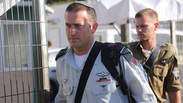
David Shapira arriving to testify
Lt. Col. David Shapira is the hero who stopped the terrorist in the 2008 Mercaz Harav Yeshiva attack; he also commanded Sgt. Elor Azaria when he shot dead an immobilized terrorist in Hebron; after giving his testimony in Azaria's case, Shapira has been subject to online abuse.
Lt. Col. David Shapira, a brigade commander in the Officers' Training School and formerly the Kfir Brigade's Shimshon Battalion commander, was subjected in recent days to online curses and invective following the testimony that he gave against his former subordinate, Sgt. Elor Azaria, who is on trial for having shot dead Abdel Fattah al-Sharif, a neutralized terrorist, in Hebron. Shapira testified that did believe Azaria was speaking the truth following the incident.
The commander is no stranger to dangerous situations. In 2008, Shapira heard an unusual noise outside his apartment in Jerusalem. He went outside with his firearm and found that a terrorist had entered the Mercaz Harav Yeshiva and was slaughtering its students with a rifle. Police, who were already on the scene, stopped Shapira as he approached the yeshiva's main entrance, instructing him to wait for the arrival of special forces.
Shapira wasn't prepared to wait, and he managed to enter the building regardless. He identified the terrorist, who had managed to wound ten and murder eight persons, and shot him dead. He received a citation for his bravery and responsibility in saving lives.
However, Shapira now finds himself in a different type of public situation. On Tuesday, he appeared as a witness for the prosecution in Azaria's trial in the Jaffa Military Court. At the time of the shooting in Hebron, Shapira was Azaria's commander. In his testimony, which was consistent with his earlier statements during the IDF's initial investigation into the incident, the commander explained that he did not believe that Azaria was speaking truthfully when he alleged that he felt in danger when he killed al-Sharif.
The online response to Shapira's were disturbing. In a Facebook group called, "We're all with Elor" (with more than 43,000 members), a sampling of the invective included: "Piece of crap, you should be put on trial"; "Shame on the IDF that these are its commanders"; "I wouldn't want a commander like that for my kids"; "Shapira should die in battle… A negligent commander who wipes the blood of his soldier for a promotion"; "To the devil with you, Mr. Coward Commander"; "You should take the kipah off your head; even God won't forgive you."
Some are calling the brigade commander "a traitor condemned to death." Omer Samani, a member of the Dror Israel Movement, posted a collection of some of the online insults. Samani wrote, "This is a worrying phenomenon in which one of the symbols of Israeli statehood—the IDF—has also become a target for incitement and inflammation. It's sad that we've reached a day where even an Israeli hero like David Shapira is attacked in this way."
A statement from the IDF Spokesperson Unit said, "The expected norm for IDF officers and soldiers is speaking the truth and giving truthful testimony. The trial in the military court concerning Sgt. Elor Azaria must be permitted to be run according to the accepted rules and without external intervention, and witnesses for the prosecution and the defense must be permitted to speak the truth without worry or fear. Any attempt to apply pressure on those involved in the legal process is reprehensible.
"Lt. Col. David Shapira is an outstanding officer and has many years of operational experience. The brigade commander received a citation for his actions and bravery in the Mercaz Harav Yeshiva terrorist attack."
The prosecution in the Azaria case, led by Nadav Weisman of the IDF Military Advocate General, concluded presenting its witnesses on Wednesday.
Lt. Col. David Shapira is the hero who stopped the terrorist in the 2008 Mercaz Harav Yeshiva attack; he also commanded Sgt. Elor Azaria when he shot dead an immobilized terrorist in Hebron; after giving his testimony in Azaria's case, Shapira has been subject to online abuse.
Lt. Col. David Shapira, a brigade commander in the Officers' Training School and formerly the Kfir Brigade's Shimshon Battalion commander, was subjected in recent days to online curses and invective following the testimony that he gave against his former subordinate, Sgt. Elor Azaria, who is on trial for having shot dead Abdel Fattah al-Sharif, a neutralized terrorist, in Hebron. Shapira testified that did believe Azaria was speaking the truth following the incident.
The commander is no stranger to dangerous situations. In 2008, Shapira heard an unusual noise outside his apartment in Jerusalem. He went outside with his firearm and found that a terrorist had entered the Mercaz Harav Yeshiva and was slaughtering its students with a rifle. Police, who were already on the scene, stopped Shapira as he approached the yeshiva's main entrance, instructing him to wait for the arrival of special forces.
Shapira wasn't prepared to wait, and he managed to enter the building regardless. He identified the terrorist, who had managed to wound ten and murder eight persons, and shot him dead. He received a citation for his bravery and responsibility in saving lives.
However, Shapira now finds himself in a different type of public situation. On Tuesday, he appeared as a witness for the prosecution in Azaria's trial in the Jaffa Military Court. At the time of the shooting in Hebron, Shapira was Azaria's commander. In his testimony, which was consistent with his earlier statements during the IDF's initial investigation into the incident, the commander explained that he did not believe that Azaria was speaking truthfully when he alleged that he felt in danger when he killed al-Sharif.
The online response to Shapira's were disturbing. In a Facebook group called, "We're all with Elor" (with more than 43,000 members), a sampling of the invective included: "Piece of crap, you should be put on trial"; "Shame on the IDF that these are its commanders"; "I wouldn't want a commander like that for my kids"; "Shapira should die in battle… A negligent commander who wipes the blood of his soldier for a promotion"; "To the devil with you, Mr. Coward Commander"; "You should take the kipah off your head; even God won't forgive you."
Some are calling the brigade commander "a traitor condemned to death." Omer Samani, a member of the Dror Israel Movement, posted a collection of some of the online insults. Samani wrote, "This is a worrying phenomenon in which one of the symbols of Israeli statehood—the IDF—has also become a target for incitement and inflammation. It's sad that we've reached a day where even an Israeli hero like David Shapira is attacked in this way."
A statement from the IDF Spokesperson Unit said, "The expected norm for IDF officers and soldiers is speaking the truth and giving truthful testimony. The trial in the military court concerning Sgt. Elor Azaria must be permitted to be run according to the accepted rules and without external intervention, and witnesses for the prosecution and the defense must be permitted to speak the truth without worry or fear. Any attempt to apply pressure on those involved in the legal process is reprehensible.
"Lt. Col. David Shapira is an outstanding officer and has many years of operational experience. The brigade commander received a citation for his actions and bravery in the Mercaz Harav Yeshiva terrorist attack."
The prosecution in the Azaria case, led by Nadav Weisman of the IDF Military Advocate General, concluded presenting its witnesses on Wednesday.
13 july 2016
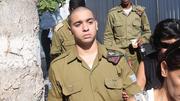
Sgt. D. says she spoke to Sgt. Elor Azaria some two hours after the incident; she says he told her 'I felt in danger because there was a knife next to the terrorist, that's why I shot him.'
A military paramedic who spoke to Sgt. Elor Azaria some two hours after he shot dead a neutralized terrorist in Hebron said Wednesday that he told her he felt in danger because the terrorist moved in the direction of a knife that was close to him, but made no mention he suspected the terrorist was wearing an explosive belt.
This further supports the prosecution's claim that Azaria, who is facing manslaughter charges, changed his version of events after the incident.
At first, Azaria claimed "He's a terrorist who tried to stab my friends, so he deserves to die." Later, he explained: "I felt in danger because he was close to the knife, and moved." And then he claimed he was "Afraid of an explosive belt on (the terrorist's) body."
A military paramedic who spoke to Sgt. Elor Azaria some two hours after he shot dead a neutralized terrorist in Hebron said Wednesday that he told her he felt in danger because the terrorist moved in the direction of a knife that was close to him, but made no mention he suspected the terrorist was wearing an explosive belt.
This further supports the prosecution's claim that Azaria, who is facing manslaughter charges, changed his version of events after the incident.
At first, Azaria claimed "He's a terrorist who tried to stab my friends, so he deserves to die." Later, he explained: "I felt in danger because he was close to the knife, and moved." And then he claimed he was "Afraid of an explosive belt on (the terrorist's) body."
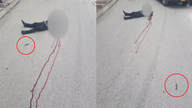
The knife before (r) and after (l) being kicked
"Elor told me that there was a terrorist who was neutralized but was still alive and that there was knife close to him. As soon as the terrorist moved his hand and head towards the knife, he (Azaria) felt in danger and that's why he shot him," said the paramedic, Sgt. D.
Sgt. D. said she was not told about a suspected explosive device at the scene of the attack.
"In a phone call between me and Elor after the incident, I asked him what happened. He didn't understand what I meant and was very confused. I asked him if he shot a neutralized terrorist. At first he said he didn't remember, and if I'm not mistaken he said he fired with everyone else. Eventually, his answer was: 'I felt in danger, and that's why I shot him. Because a knife was next to the terrorist.' After the phone call with Elor I called the unit's mental health officer and told him Elor was in panic, and I asked him to talk to him."
When asked about the procedures followed by paramedics and medics in the field, she said, "What we were taught in the military course is that we should treat the most seriously wounded person (first —ed.), and the issue of whether he's a terrorist or not was not addressed. I don't know of a different official procedure other than treating the most seriously wounded person, regardless of whether they're a terrorist or a soldier. If the terrorist Elor shot had a pulse, we would have started treating him."
Her testimony at court on Wednesday morning was in line with the testimony she gave the IDF's Criminal Investigation Division (CID).
On March 24, two terrorists carried out a stabbing attack in the Tel Rumeida neighborhood in Hebron, moderately wounding one soldier. Both were shot and neutralized. One was killed and the other, Abed al Fatah a-Sharif, remained lying on the ground seriously wounded.
A B'Tselem cameramen who was filming the scene after the incident captured Azaria cocking his weapon and shooting a-Sharif, killing him.
Two platoon commanders and the company commander were rebuked by the Kfir Brigade commander for not treating the wounded terrorist and evacuating him to the hospital.
An investigation by the GOC Central Command found that Azaria decided to open fire of his own volition.
"Elor told me that there was a terrorist who was neutralized but was still alive and that there was knife close to him. As soon as the terrorist moved his hand and head towards the knife, he (Azaria) felt in danger and that's why he shot him," said the paramedic, Sgt. D.
Sgt. D. said she was not told about a suspected explosive device at the scene of the attack.
"In a phone call between me and Elor after the incident, I asked him what happened. He didn't understand what I meant and was very confused. I asked him if he shot a neutralized terrorist. At first he said he didn't remember, and if I'm not mistaken he said he fired with everyone else. Eventually, his answer was: 'I felt in danger, and that's why I shot him. Because a knife was next to the terrorist.' After the phone call with Elor I called the unit's mental health officer and told him Elor was in panic, and I asked him to talk to him."
When asked about the procedures followed by paramedics and medics in the field, she said, "What we were taught in the military course is that we should treat the most seriously wounded person (first —ed.), and the issue of whether he's a terrorist or not was not addressed. I don't know of a different official procedure other than treating the most seriously wounded person, regardless of whether they're a terrorist or a soldier. If the terrorist Elor shot had a pulse, we would have started treating him."
Her testimony at court on Wednesday morning was in line with the testimony she gave the IDF's Criminal Investigation Division (CID).
On March 24, two terrorists carried out a stabbing attack in the Tel Rumeida neighborhood in Hebron, moderately wounding one soldier. Both were shot and neutralized. One was killed and the other, Abed al Fatah a-Sharif, remained lying on the ground seriously wounded.
A B'Tselem cameramen who was filming the scene after the incident captured Azaria cocking his weapon and shooting a-Sharif, killing him.
Two platoon commanders and the company commander were rebuked by the Kfir Brigade commander for not treating the wounded terrorist and evacuating him to the hospital.
An investigation by the GOC Central Command found that Azaria decided to open fire of his own volition.
